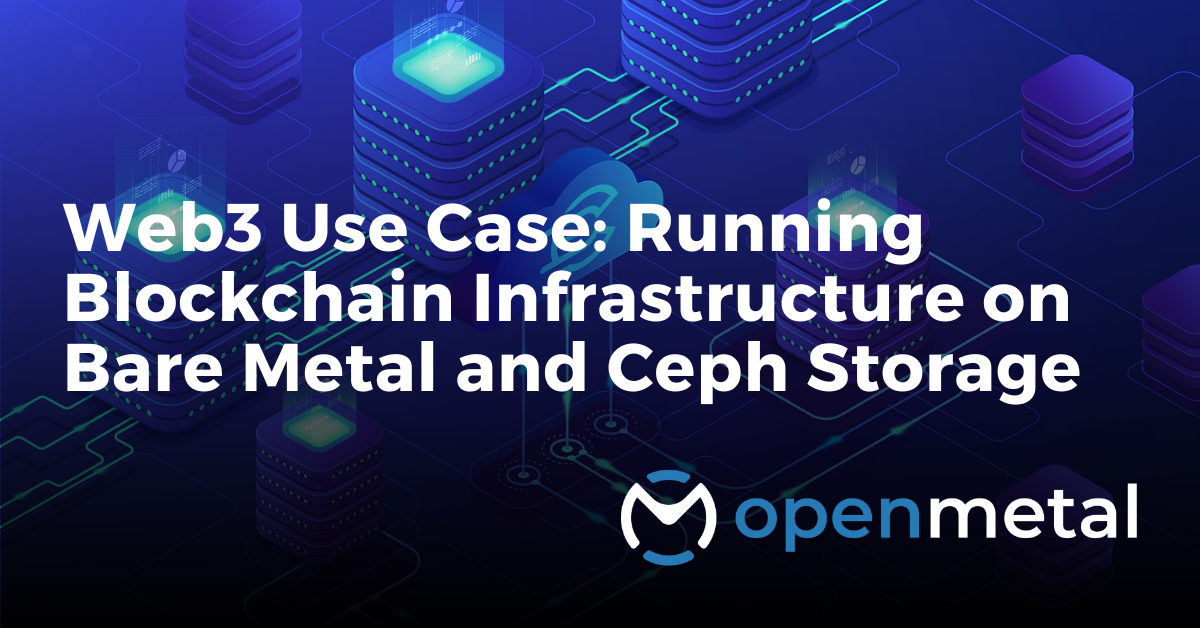
Running blockchain infrastructure on bare metal and Ceph storage gives development teams more control, performance, and cost efficiency—especially when scaling storage-heavy Web3 applications.
In this use case, a Web3 team building a decentralized storage and data availability protocol needed an infrastructure partner that could deliver low-cost, high-throughput storage without sacrificing flexibility. They chose OpenMetal’s bare metal servers and Ceph storage clusters to meet their performance needs and reduce costs per terabyte across their architecture.
The Infrastructure Challenge
The team behind the decentralized storage protocol needed a cost-effective way to build and scale blockchain infrastructure on bare metal and Ceph storage that could handle large binary datasets (‘blobs’) of data across a distributed network. Their goal was to achieve the lowest cost per TB possible while maintaining performance and redundancy. Traditional cloud solutions were either too expensive or didn’t offer the flexibility and bare metal control they required.
They also wanted to scale easily and maintain consistency across deployments. That meant choosing infrastructure that could grow with them without introducing new operational overhead or sacrificing data availability.
Example Infrastructure Architecture for Storage Workloads
To support their storage layer, the team deployed a cluster of five OpenMetal Ceph-based storage servers:
- Four Large v3 storage servers: Intel Xeon Silver 4314, 256GB RAM, 216TB HDD, 1.6TB NVMe SSD
- One Large v1 storage server: Intel Xeon Silver 4210R, 128GB RAM, 144TB HDD, 4TB NVMe SSD
This combination of storage nodes provided both high-capacity spinning disks for large-scale data storage and NVMe SSDs for fast I/O operations. The NVMe tier supports rapid blob access and indexing while the HDDs handle durable, large-scale blob persistence. Together, the setup gave the team flexibility to support different performance tiers for storage-intensive Web3 workloads.
The Large v3 servers were chosen for their balance of memory, disk, and IOPS throughput—making them ideal for distributed object storage systems like Ceph. With 256GB of RAM, each node had enough memory to support large write buffers and caching layers that improve cluster responsiveness under load.
The Large v1 server was used to diversify and extend the cluster’s storage capacity with cost-effective high-density storage.
All systems were deployed within the same region to maximize cluster consistency and simplify internal replication logic. This ensured faster intra-cluster communication and made performance tuning easier for the development team.
Benefits Delivered by OpenMetal
- Significantly reduced cost per terabyte of storage
- High throughput object storage for blob-heavy use cases
- Full control over infrastructure with single-tenant hardware
- Ability to scale storage capacity with consistent performance
- Responsive support and easy onboarding for bare metal Ceph environments
Summary and Takeaway
By working with OpenMetal, the team brought their decentralized storage product online while meeting strict cost goals. They achieved a lower per-terabyte cost than with previous vendors—without giving up control or flexibility. Running five Ceph storage servers gave them the throughput and redundancy needed to support storage replication, availability, and performance. With dedicated hardware and OpenMetal’s responsive support, they avoided the complexities of managing multiple cloud environments.
Learn more about how teams are using blockchain workloads on bare metal to go beyond cryptocurrency applications.
About OpenMetal
OpenMetal provides innovative private cloud infrastructure tailored for businesses looking for greater autonomy, security, and control over their cloud environments. Leveraging OpenStack technology, OpenMetal delivers a flexible, cost-effective alternative to public hyperscalers, enabling organizations to host mission-critical applications and data with unparalleled efficiency and privacy.
Read More on the OpenMetal Blog



































